Reliable Fixes for Mini Split Leaking Water: Your Ultimate Guide
“Did you know a simple water leak from your mini split can lead to a hefty repair bill if not handled immediately?” John Parker, a seasoned HVAC technician with two decades of field experience, breaks the ice. In this article, he shares comprehensive knowledge and professional insights to help you address mini split leaking water effectively.
John dives into the common triggers of leaks, tips for early detection, and vital preventive maintenance measures. With real-life anecdotes and straightforward language, he methodically demystifies these essential HVAC topics just as comfortably as discussing them over a cup of coffee at your kitchen table.
This is a must-read for anyone who values comfort and economy in home maintenance – a gateway to not just a cozy home, but also peace of mind when it comes to your mini split system.
What Causes a Mini Split to Leak Water?
So, you’ve got a mini split leaking water and you’re wondering what could be going wrong. Here’s a closer look at some of the usual culprits and how to fix them:
Blocked Drain Line
- Causes: Over the years, I’ve seen everything from dirt and debris to algae growth, mold, and even little critters blocking a drain line. All this stuff can cause water to back up and spill over.
- Solution: Your best bet is to use a wet/dry vac or a bleach solution to clear that blockage, and you’ll be in good shape.
- Prevention: Keep an eye on your drain line and make sure it’s clear of obstructions, so condensation flows freely away from your unit.
Improper Installation
- Causes: This one’s pretty common. If your unit isn’t installed just right, especially if it’s not level, condensation will leak back into the unit rather than properly draining.
- Solution: Make sure your installer knows their stuff and follows proper procedures, including leveling the unit.
- Prevention: Be diligent during installation. A well-installed unit means fewer headaches down the road.
Broken Condensate Pump
- Causes: The condensate pump’s job is to get rid of the collected water, but like all things, it can fail or get damaged.
- Solution: You’ll probably need a pro to either repair or replace the pump if it’s on the fritz.
- Prevention: Regular checkups and timely repairs can keep your pump in working order and prevent leaks.
Bad Drain Pan
- Causes: A drain pan can take a beating over time—rust, cracks, and general wear and tear can cause it to leak water.
- Solution: If your drain pan’s damaged, a pro should replace it to prevent your mini split from dripping all over.
- Prevention: Regular inspections and maintenance of your drain pan will keep it in good shape and leak-free.
Dirty Air Filter
-
Causes: When an air filter gets clogged, it restricts airflow and makes the evaporator coils sweat like crazy, causing water leaks.
In this video, learn three effective methods to fix a mini split leaking water by clearing a clogged condensate line, ensuring your system runs smoothly and efficiently. - Solution: Simply cleaning or replacing the air filter can do wonders for maintaining proper airflow.
- Prevention: Keep up with air filter maintenance—clean or replace it every couple of weeks to prevent leaks.
Freeze-Induced Leaks
- Causes: Low refrigerant levels or dirty filters can cause your evaporator coils to freeze. When they thaw, you’ve got water leakage.
- Solution: Fixing the underlying issue, whether it’s refrigerant levels or a dirty filter, should clear up the problem.
- Prevention: Regularly check both refrigerant levels and your air filter to keep things running smoothly.
Extreme Humidity
- Causes: High indoor humidity can make your drain pan work overtime, and if it’s overwhelmed, it’ll start leaking.
- Solution: Keeping up with maintenance and maybe opting for a bigger drain pan can help manage extreme humidity.
- Prevention: Regular system checks can help you stay on top of humidity issues and keep your drain pan from overflowing.
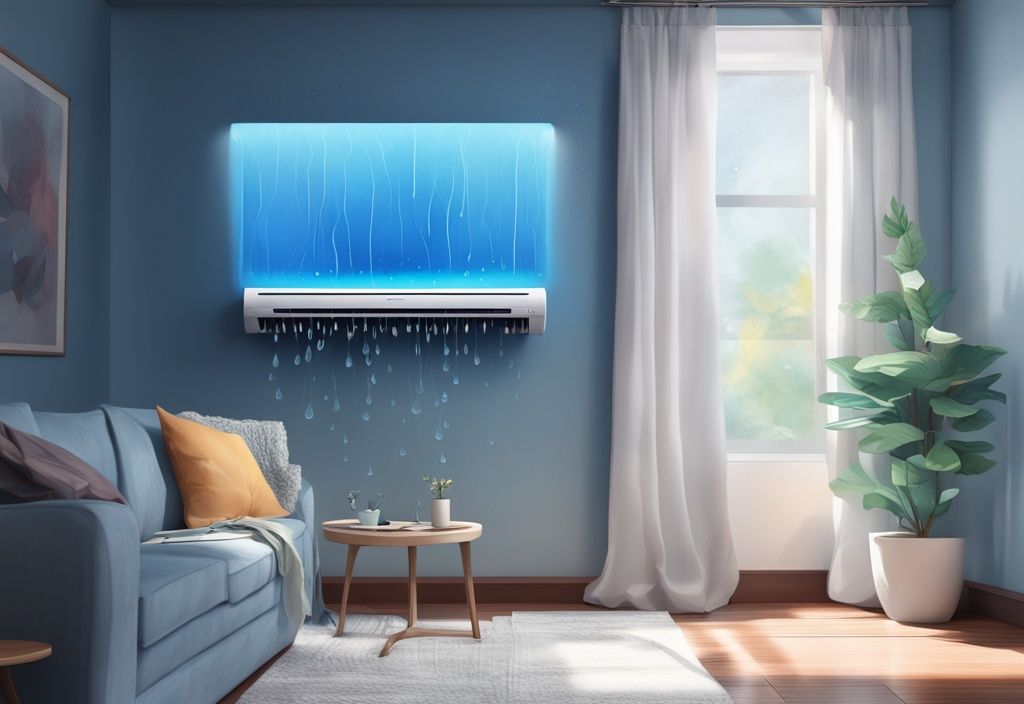
Refrigerant Leaks and Their Impact
Refrigerant leaks in a mini split system can spiral into several issues, from water leakage to health risks. Let’s break down how low refrigerant levels can cause your mini split to leak water and why addressing these leaks professionally is crucial.
Low Refrigerant Levels
One common headache I see often is low refrigerant in mini split systems. When not enough refrigerant is circulating, the evaporator coils inside your unit can freeze. Here’s the kicker—when those coils eventually thaw, the resulting meltwater can overwhelm the drain pan, causing a leakage mess. This is usually a red flag pointing to bigger issues like loose connections or damaged parts within the system.
To tackle these low refrigerant issues head-on and stop your mini split from leaking water constantly, you need to get a pro on the job pronto. An experienced technician can hunt down the root cause and fix it, ensuring your system isn’t just patch-fixed but running like a well-oiled machine. Trust me, nipping this in the bud saves you a lot of hassle in the long run.
Health Risks and Professional Repair
Leaky refrigerant doesn’t just mess with the efficiency of your mini split; it’s also a stealthy health risk. Breathing in refrigerant fumes can lead to all kinds of respiratory issues and skin problems. And let’s not forget, these gases aren’t doing our environment any favors either—they’re notorious for depleting the ozone layer.
Given these risks, it’s absolutely vital to get a certified technician to handle repairs when your mini split’s refrigerant is leaking. Pros have the right gear and know-how to safely repair and recharge your system, ensuring it runs safely and doesn’t harm you or the planet.
In summary, addressing refrigerant leaks promptly not only safeguards your health but also keeps your mini split unit performing efficiently over the long haul. Professional intervention is your best bet to minimize risks and maintain the integrity of your air conditioning system.
Warning Signs of Water Leakage
Spotting water leakage in a mini split system can save you from bigger headaches down the line. Here are some sure-fire signs to watch out for.
Pooling Water or Wet Spots
- Visible pooling water or wet spots around your unit — Clear as day, if you see water collecting or damp patches, it’s a red flag that your mini split is leaking water.
- Investigate and repair immediately to stop further damage to both your property and the unit itself.
Decreased Performance or Cooling Power
- Declining cooling efficiency — If your mini split’s cooling isn’t up to snuff, it might be due to water leakage.
- This drop in performance often hints at moisture accumulation and potential water damage, so it’s best to pay attention right away.
Unnatural Freezing Within the Unit
- Ice formation inside the unit — This usually means there are underlying problems like low refrigerant levels or airflow blockages.
- Paired with leaks, this issue needs a quick fix to get your unit back in working order and ward off further ice and water damage.
Damp or Musty Odors
- Damp or musty odors from the unit — These smells often signal mold or mildew growth due to water leakage.
- Not only are these odors unpleasant, but they also pose health risks, requiring swift action.
High Humidity Levels
- Unusual indoor humidity — This can be another sign of a mini split leaking water, making things uncomfortable inside and potentially leading to further damage.
- Fixing the leak and its cause will help bring humidity levels back to normal and improve indoor air quality.
Preventive Maintenance Tips
Keeping your mini split system in top shape can save you a lot of trouble down the road. Here are some key maintenance tips to help you avoid water leakage and ensure smooth operation.
Cleaning and Replacing Filters
- Regularly cleaning or replacing air filters is crucial for maintaining proper airflow and preventing your mini split from leaking water. Dirty filters can cause moisture to build up, leading to potential leaks.
- Make it a habit to check the filters every two weeks. This simple routine can help you catch any issues early and keep your system running efficiently.
- Clean filters reduce strain on the unit, ensuring it runs smoothly and reduces the chance of water leakage. I’ve seen many units with clogged filters that led to serious problems—don’t let yours be one of them.
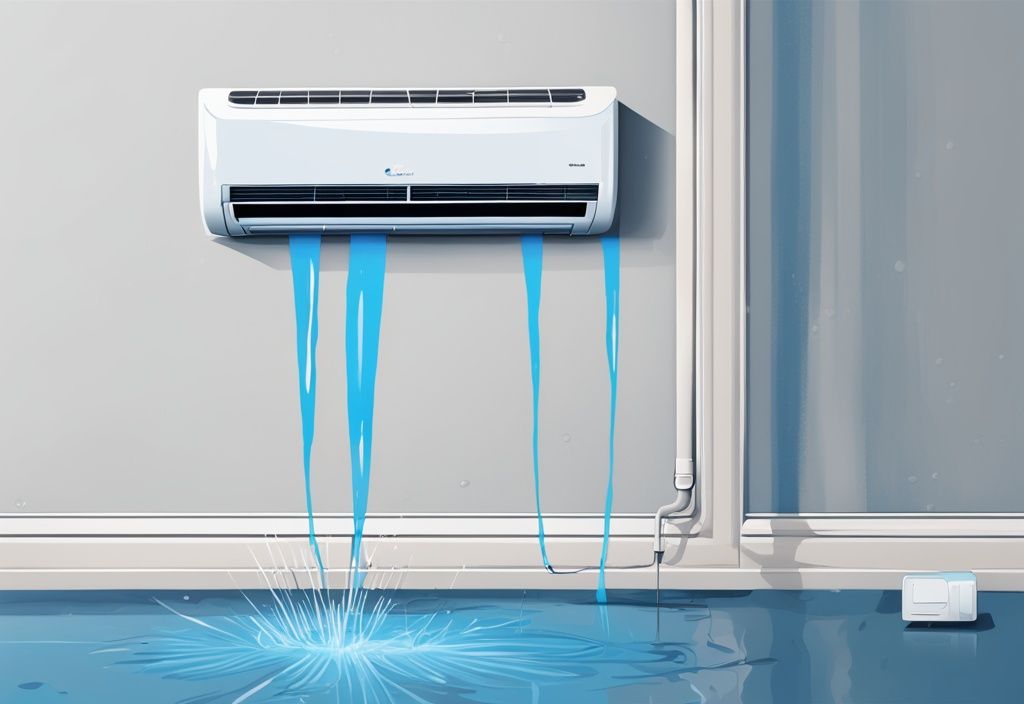
Inspecting Coils
- Routine inspections of both evaporator and condenser coils are vital for the system’s health. Over time, these coils can get quite dirty, affecting the unit’s performance.
- Dirty coils can disrupt the unit’s efficiency, leading to the formation and eventual leakage of water. A simple cleaning can make a world of difference here.
- Clean coils contribute to optimal performance and help reduce the likelihood of leaks from excessive condensation. Trust me, it’s worth the effort.
Checking Refrigerant Levels
- Maintaining proper refrigerant levels is essential to prevent problems such as freeze-induced leaks in your mini split. Refrigerant that’s too low can cause the system to freeze up and thaw, leading to water leaks.
- Regular monitoring helps in identifying low refrigerant issues before they cause significant damage or leaks. A quick check can save you a big headache later on.
- Always engage a qualified technician to handle refrigerant checks and adjustments to ensure safety and efficacy. I’ve seen DIY attempts go wrong, and it’s just not worth the risk.
Ensuring Proper Drainage
- Make sure the drain line and pan are free from any obstructions that could cause water backups and leaks. This is a common issue that can be easily avoided with regular checks.
- Pooled water or clogs in the drainage system can lead to serious leakage issues within your unit. A little maintenance here can prevent a flood later.
- Regular checks and cleaning of the drainage components can significantly reduce the risk of encountering water leaks. It’s a small step that makes a big difference.
Scheduling Professional Maintenance
- Secure professional maintenance at least once a year, more frequently if you live in dusty or high-use environments. Professional eyes can spot problems before they become crises.
- Expert maintenance not only ensures optimal system performance but also tackles any minor issues before they escalate into significant problems. It’s about investing in peace of mind.
- A professional’s touch ensures all components are in top shape, minimizing risks of mini split leaking water while enhancing longevity and efficiency. Over the years, I’ve seen countless systems last longer and work better because of regular professional care.
When to Call a Professional
Knowing when to call in a professional for your mini split leaking water can save you time, money, and a lot of headaches. While some minor issues can be tackled on your own, major repairs and ensuring you’re working with the right expert are crucial. Let’s dive into the details.
Major Repair Needs
If you’re dealing with major repair needs, like a broken condensate pump or refrigerant issues, it’s time to call a professional. I’ve seen many DIY attempts go awry, and trust me, mishandling these repairs can lead to even more damage or void your warranty.
Take the broken condensate pump, for instance. This little component is essential for removing accumulated condensation from your mini split unit. If it’s on the fritz, don’t try to fix it yourself. This is a job for a trained technician who knows the ins and outs of your system.
The same goes for refrigerant issues. These problems need to be handled by certified professionals with the right tools and knowledge. An improper refill can cause leaks or even harm the environment. So, when your mini split is leaking water and the issue points to something substantial, make that call to a professional.
Experience, Credentials, and Reviews
Choosing the right professional for a mini split leaking water can seem daunting. Here’s a neat trick: focus on their experience and credentials. An experienced service provider with a track record of handling mini splits is more likely to diagnose and fix the problem correctly.
Check if they are licensed and insured. Verified credentials can protect you from any potential issues down the road. Also, take a peek at reviews and testimonials. Positive feedback from other customers can offer you peace of mind about their service quality and reliability.
Finally, while it’s tempting to go for the cheapest option, remember that balance is key. Weigh their reputation and expertise alongside cost considerations. Sometimes spending a bit more upfront can save you from extra costs and stress later on.
Replacing a Persistently Leaking Unit
When dealing with a mini split leaking water, knowing when to replace the unit can save you a lot of headaches down the line. Here are some key reasons why a replacement might be the best course of action:
- Persistent Leakage Issues: If your mini split is consistently leaking water, it’s more than just a minor inconvenience. Regular leaks are usually a sign of deeper, unresolved issues that repairs just can’t fix. Multiple repair attempts without lasting success might indicate it’s time for a new unit.
- Structural Water Damage: Continuous water leakage can wreak havoc on your home’s structure. If your AC float switch keeps tripping, it might be a sign of a larger problem that requires immediate attention. From damaging walls, ceilings, and flooring to potentially compromising electrical systems, the risks are significant and can create safety hazards.
- Unresolved Problems: Ongoing leaks often mean serious internal issues like corroded components, faulty drains, or other extensive damage. Temporary fixes can only go so far, and addressing the root cause often means considering a full replacement.
- Safe Operation: By replacing the leaking mini split, you can ensure safe and efficient operation. A new unit eliminates the constant stress and inconvenience associated with persistent leaks, giving you peace of mind.
- Cost-Effectiveness: Though there’s an upfront cost to replace a unit, it can be more economical in the long run. Investing in a new, efficient mini split can reduce the need for repeated repairs, lower energy consumption, and ultimately save on utility bills.
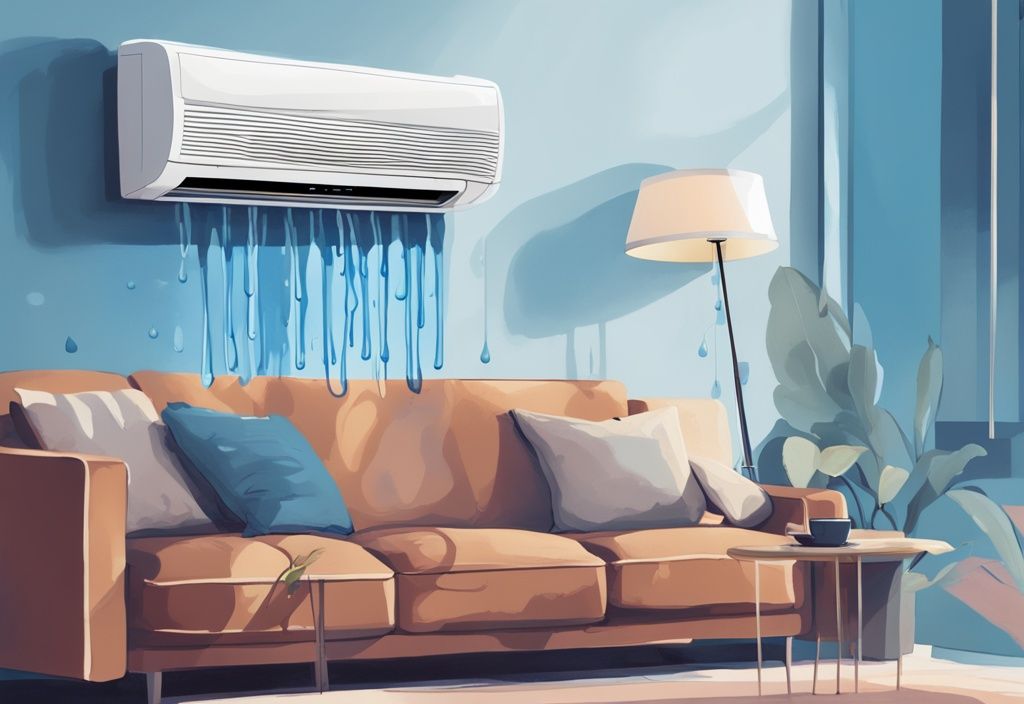
Choosing a new unit not only boosts the performance and reliability of your air conditioning system but also significantly reduces the risks of water damage and frequent repairs. Maintaining this new unit through regular professional check-ups will further ensure its longevity and efficiency, keeping your home comfortable and safe.
Conclusion
A mini split leaking water can lead to substantial discomfort and potential damage if not addressed swiftly. Understanding the various causes of leaks, from blocked drain lines to dirty air filters, is fundamental to maintaining an efficient cooling system.
Detecting the warning signs early—such as pooling water, decreased performance, or unusual odors—can prevent minor issues from escalating into major problems.
Addressing a leaky mini split can feel like a daunting task, but it’s entirely manageable with a bit of know-how. Whether it’s a clogged drain line or a dirty air filter, these issues are often simpler than they appear. For instance, if you’re dealing with a different brand, you might need to locate the GE air conditioner reset button to troubleshoot effectively.
Picture this: one time, I had a client with water pooling around their unit, and it turned out to be just a small blockage. We cleared it up in no time, and their system was back to top shape.
Consistent preventive measures, like cleaning or replacing air filters regularly and inspecting for incorrect installation or broken components, are crucial. If you’re dealing with an HVAC issue, such as a GE AC error code 88 fix, ensuring proper maintenance can often prevent these problems from occurring. Think of your mini split like a car; it needs regular check-ups to run smoothly. By keeping an eye on these small maintenance tasks, you can save yourself from bigger headaches down the line.
Bringing in a professional for routine maintenance is indispensable, ensuring that potential issues are identified and corrected before they escalate. Trust me, professional attention at regular intervals can do wonders for extending the life of your mini split. I’ve seen so many units purring like kittens just because their owners invested in consistent care.
In conclusion, addressing a mini split leaking water promptly, understanding the underlying causes, and adhering to diligent maintenance practices can significantly enhance the reliability and longevity of your system. Keeping your mini split in good shape isn’t just about comfort—it’s about protecting your investment and peace of mind.
FAQ
Why is my mini split leaking water inside?
- First off, a mini split leaking water inside could be due to a blocked drain line, which is pretty common. When the condensate line gets clogged, water backs up and leaks inside.
- You could also be looking at improper installation. If the system isn’t level or the drain line isn’t properly set up, you might end up with leaks.
- Another culprit might be a broken condensate pump. These pumps are supposed to remove water, so if they’re on the fritz, water will find its way inside.
- A damaged drain pan is another possible reason. Over time, these pans can crack or corrode, leading to leaks.
- Don’t forget about a dirty air filter. When air filters get clogged, they restrict airflow, causing the evaporator coils to freeze and thaw, resulting in water leakage.
- Extreme humidity or freeze-induced leaks can make the situation worse.
Can I fix a leaking mini split myself?
- If you’re dealing with a mini split leaking water because of a dirty air filter or a blocked drain line, you can certainly roll up your sleeves and handle it yourself. It’s a manageable task for most homeowners.
- But when it comes to more technical issues like refrigerant leaks or a broken condensate pump, it’s time to call in a pro. Trust me, you don’t want to mess around with refrigerants without the right tools and expertise.
How often should I clean the air filter to prevent leaks?
- To keep your mini split running smoothly and prevent those annoying water leaks, you should clean or replace the air filter every two weeks.
- This regular upkeep maintains optimal airflow and stops leaks that could occur from restricted airflow.
What are the dangers of ignoring a leaking mini split?
- Ignoring a mini split leaking water is a real gamble. It can lead to mold and mildew growth, which is bad news for your indoor air quality.
- Then there’s the damage to your walls, flooring, and electrical systems. Water and electricity don’t mix, my friend.
- On top of that, your unit won’t run efficiently, making it work harder and costing you more on energy bills. Plus, the cooling performance goes downhill.
When should I replace my leaking mini split?
- If your mini split keeps leaking despite multiple repairs, it might be time to think about a replacement. Sometimes, recurring leaks point to underlying issues that just can’t be fixed.
- Replacing it ensures safe operation and saves you the headache and cost of dealing with ongoing leaks. It’s like ripping off a band-aid—painful but necessary.
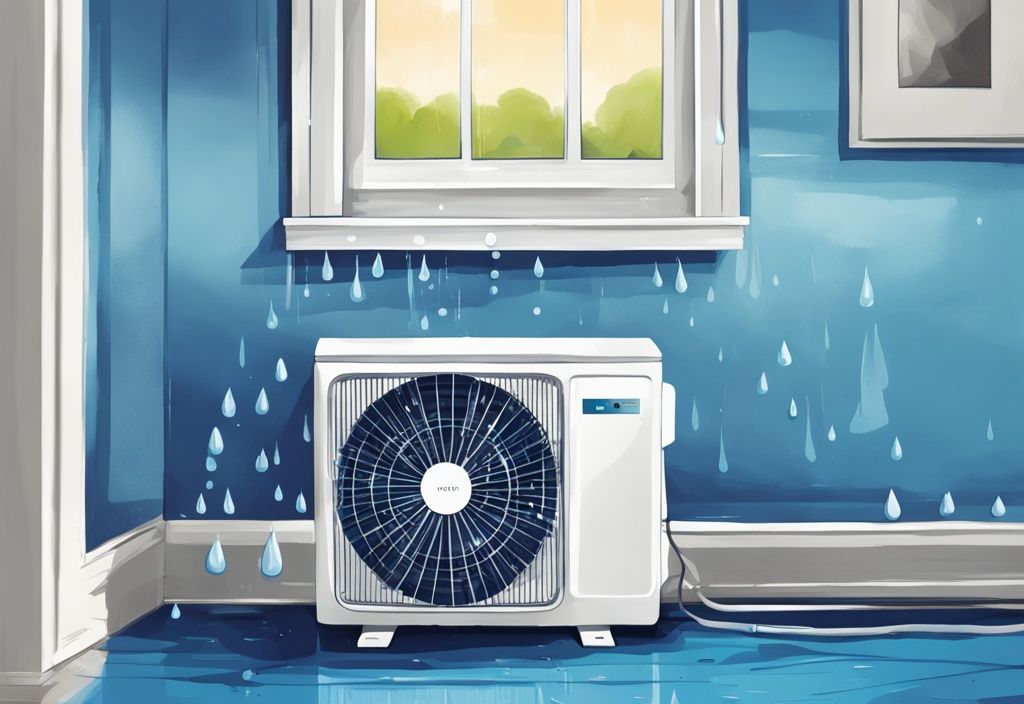
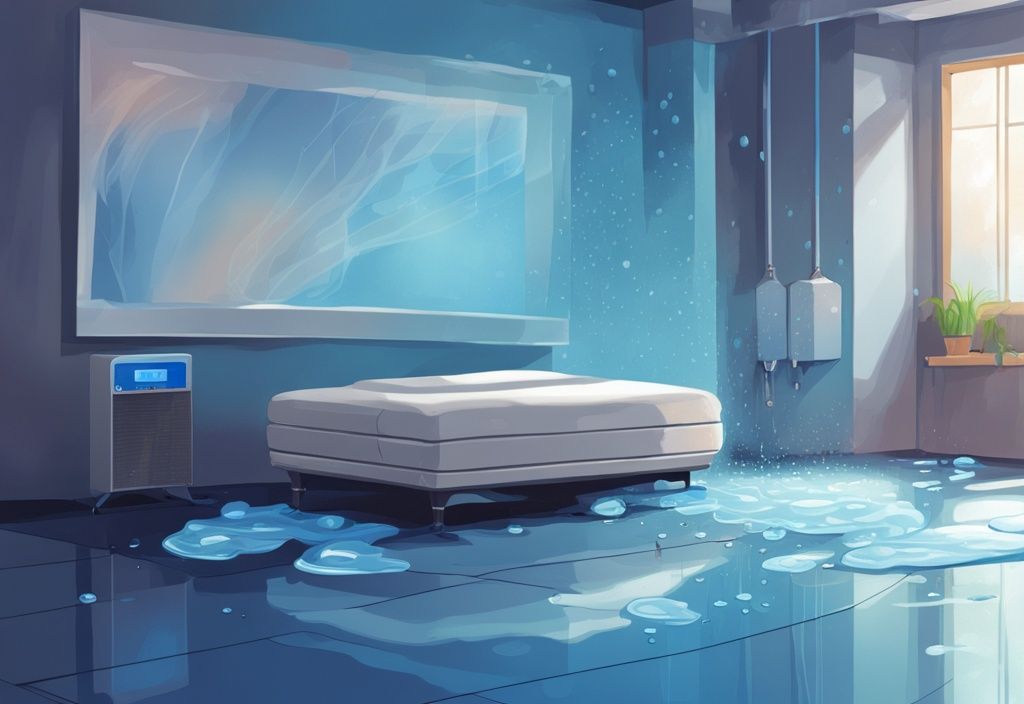
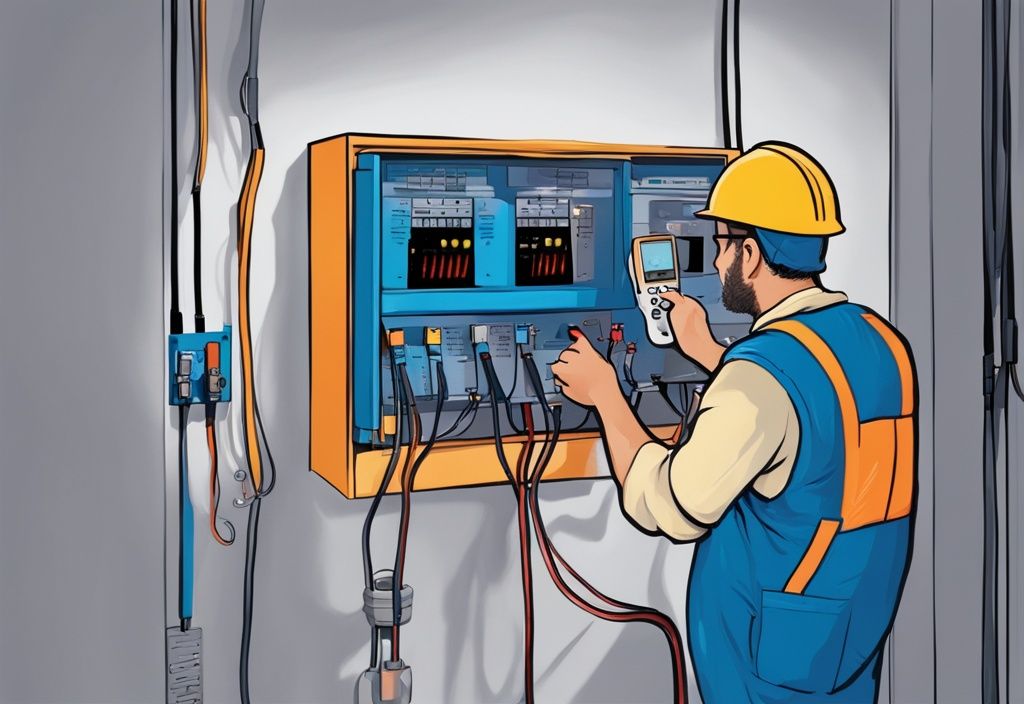
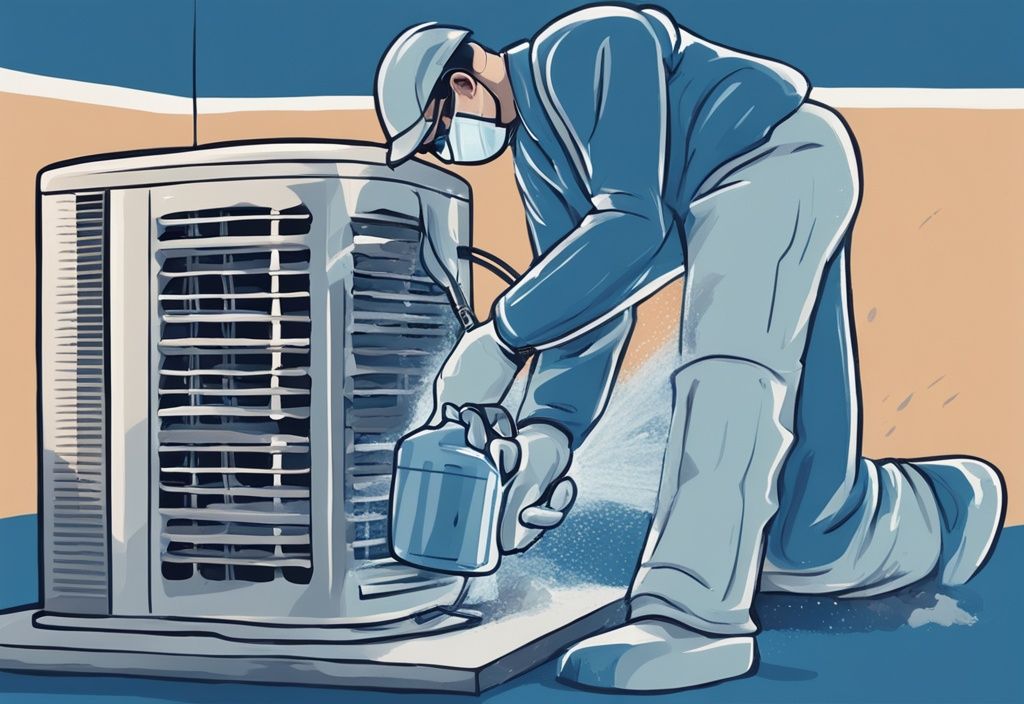
Post Comment